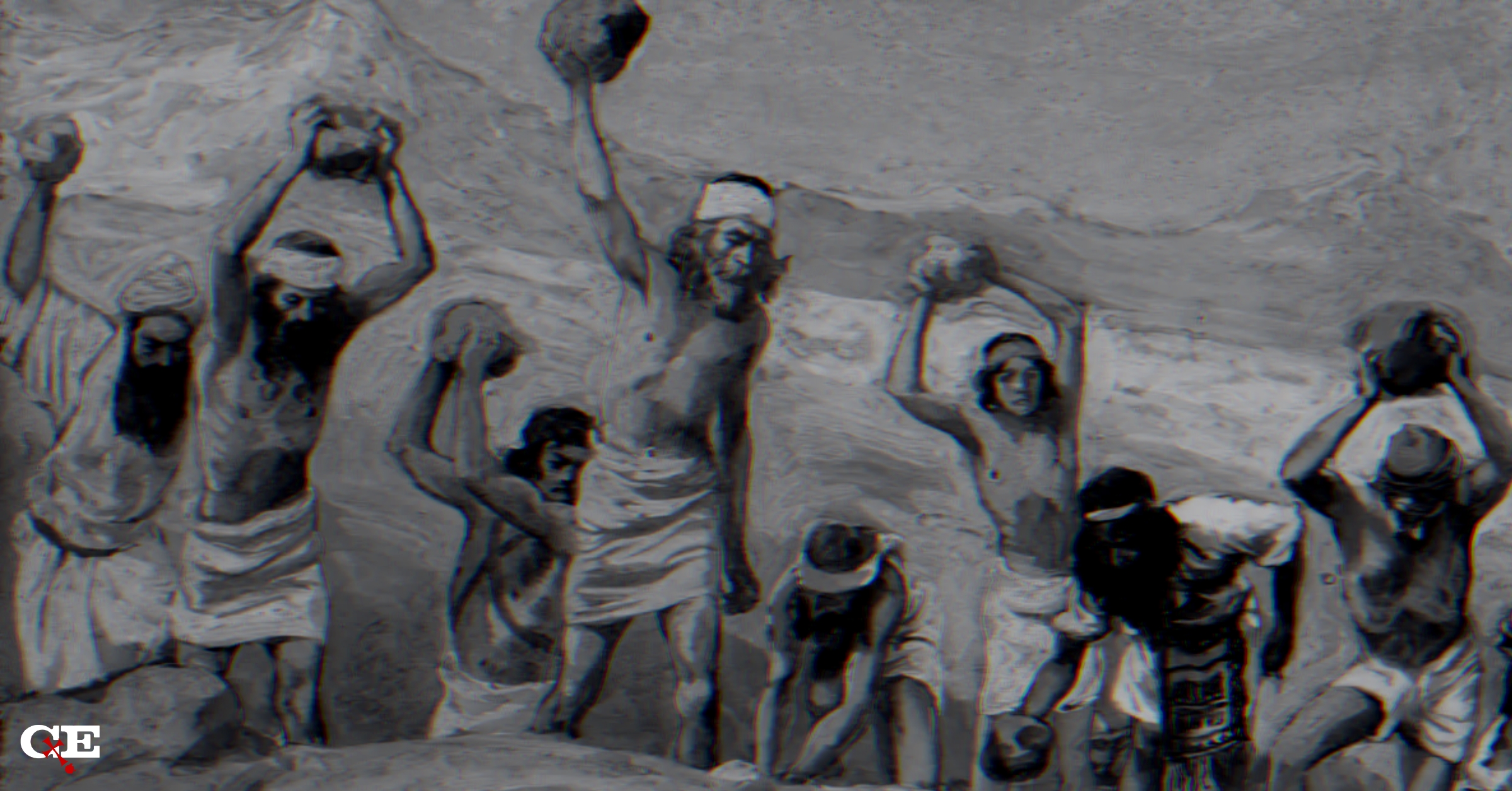When it comes to Bible reading, some passages are more challenging than others. Such is the case with the stoning passages (see Leviticus 20:27; 24:16; Numbers 15:32-36; Deuteronomy 13:6-11; 21:18-21). These aren’t our go-to passages for morning devotionals. Personally, I can understand capital punishment, but stoning as a means to achieving it just seems so barbaric, cruel, and harsh, especially when the commandment is issued to parents to indict rebellious sons, as seen in Scripture:
“If a man has a stubborn and rebellious son who will not obey the voice of his father or the voice of his mother, and, though they discipline him, will not listen to them, then his father and his mother shall take hold of him and bring him out to the elders of his city at the gate of the place where he lives, and they shall say to the elders of his city, ‘This our son is stubborn and rebellious; he will not obey our voice; he is a glutton and a drunkard.’ Then all the men of the city shall stone him to death with stones. So, you shall purge the evil from your midst, and all Israel shall hear, and fear” (Deuteronomy 21:18-21).
This is a hard passage to stomach, don’t you think? I prefer death by lethal injection, or death by a laced bong hit, but stoning? What a mess. As believers, how are we to understand these verses? Below are five thoughts to consider as you seek to come to terms with this passage.
1. It’s an Ancient Context.
First, we need to understand this text, like all texts, in context. We can’t overlay our twenty-first century cultural understanding on this ancient milieu. Nothing will lead to more head-scratching confusion and frustration than that. Ours is a culture where a minor swat on our child’s gluteus maximus causes an uproar. No wonder stoning is extra hard for us to digest.
2. It’s a Last Resort.
Second, stoning was the last resort. The son described in these verses exhibits an unbending and rebellious spirit. He’s steeped in sin, freely giving himself to drunkenness and gluttony, and refuses to respond to any parental discipline, altogether shunning the fifth commandment. These verses describe a seemingly hopeless case, one set in his own ways as he strong-arms God, his parents, and the principles of his surrounding theocratic nation. He’s a morally sick son whose sin will spread and undo the moral fabric of the whole community nation, if left unchecked. Once the parents realize their son’s recalcitrance, they seek outside intervention as a final resort.[i]
3. Morality Matters At a Community-Level.
Third, the ultimate purpose of stoning was to purge evil from the community and to create a healthy fear of living an unchecked moral life. The health of the nation depended on the entire community walking in alignment with God. That’s not to say people didn’t sin. They did. A lot. And there was an entire sacrificial system in place so people could once again obtain a clear conscience before the Lord. The son described in these verses wasn’t looking for a clear conscience—his conscience was seared.
4. It’s Rare.
This wasn’t a common custom. Interestingly enough, we have very few instances of stoning that take place in the biblical records and I’m not aware of any extra biblical evidence that this punishment was commonly carried out. Perhaps the threat was enough to deter people from such rebellious behavior.
5. Jesus Answers This Law With Grace.
Finally, Jesus models the heart of God regarding stoning.[ii] In John 8:7 Jesus said to those who accused the adulterous women, “Let him who is without sin among you be the first to throw a stone at her.” The law teaches us that we are all lawbreakers. Everyone under God’s law deserves capital punishment, but Jesus experienced capital punishment on our behalf even though He was the only one to ever fulfill the law. Essentially, He was stoned for us in an act of unconditional love as He experienced death on our behalf.
REFERENCES
[i] Editor’s Note: It should also be noted that there’s a cultural corrective built into this scenario to prevent abusing capital punishment. Children were seen as a blessing, a legacy and a source of pride and joy for parents. Plus, even today, it’s only natural for parents to be biased in favor of their own children. So, if anyone was going to advocate to protect and defend one’s children from capital punishment, it’s the parents. In that way, there was a cultural corrective built-into that relation, to keep parents bearing false witness against their child and from doling out a capital punishment lightly. Second, parents would also be the experts on their own children, knowing them better than anyone else. So, if this child is a menace to society, the parents are in a position to recognize that threat before anyone else does. Third, parents already have relational authority over their own children. That means they can make judgments over their children; that’s part of their job as parents. Now they don’t have the natural right to directly kill their kids, but they do have a judicial role over their children, so that court rulings over their children are treated here as an extension or continuation of parental authority over the child. Fourth, even still, this passage isn’t saying that parents have a right to kill their children. Rather, the parents are coming forward as the chief witnesses against their rebellious child. While they created that child, and they have a normal responsibility to raise and care for them, they cannot kill that child as a general right of parenthood. That’s why they have to present their child before a larger judging body, a court of the elders, Sanhedrin, priests, etc., to make that higher-court decision. The parents, in that case, are not the “Judges” issuing a death sentence, they are more like the arresting officers and lead witnesses against their prodigal child. Sixth, that era also had no standing police force and no prison system, and the judicial/court system was usually a small counsel of community leaders (elders, priests, etc.). All that means the punishments had to fit the crime, without requiring an elaborate police force, prison system, or a complicated court system. Stoning was a low-cost, effective, means of containing serious threats and reducing crime. Plus, it’s administered by the whole community, so the whole community takes responsibility for the court rulings. This means no single person can be both judge and executioner. One or two people could be bribed or tricked into a guilty-verdict, but it’s a lot harder to do that to the whole community.
[ii] I realize our earliest manuscripts do not include John 7:53–8:11. Regardless, these verses depict a consistent vision of the life and actions of Jesus Christ.
Recommended resources related to the topic:
Legislating Morality (mp4 download), (DVD Set), (MP3 Set), (PowerPoint download), and (PowerPoint CD) by Frank Turek
Legislating Morality: Is it Wise? Is it Legal? Is it Possible? by Frank Turek (Book)
A Father’s Embrace (DVD), (Mp3), (Mp4 Download), and (PowerPoint download) by Dr. Frank Turek
If God, Why Evil? (DVD Set), (MP3 Set), and (mp4 Download Set) by Frank Turek
__________________________________________________________________________________________________________________________
Bobby serves as lead pastor of Image Church in Charlotte, North Carolina, and is well known for his YouTube ministry called, One Minute Apologist, which now goes by the name Christianity Still Makes Sense. He also serves as the Co-Host of Pastors’ Perspective, a nationally syndicated call-in radio show on KWVE in Southern California. Bobby earned his Master of Theology degree from Dallas Theological Seminary, his Doctor of Ministry in Apologetics from Southern Evangelical Seminary, and his Ph.D. in Philosophy of Religion from the University of Birmingham (England), where he was supervised under David Cheetham and Yujin Nagasawa. Bobby’s also written several books, including The Fifth Gospel, Doubting Toward Faith, Does God Exist, and Fifty-One Other Questions About God and the Bible, and the forthcoming Christianity Still Makes Sense, to be published by Tyndale in April 2024. He’s married to his lovely wife Heather, and together they have two grown kids: Haley and Dawson.










